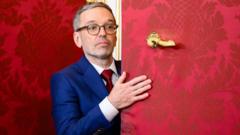Austria's political landscape is undergoing a dramatic transformation as President Alexander Van der Bellen has assigned the far-right Freedom Party's (FPO) leader, Herbert Kickl, with the responsibility of forming a coalition government. This move could result in Austria's first coalition led by the Eurosceptic and Russia-friendly FPO, following its strong performance in the recent elections where it secured around 29% of the vote.
Despite its electoral success, the FPO faced initial resistance from Van der Bellen, who chose to task the conservative People's Party (OVP) with government formation after the election, a decision that angered FPO supporters. The former Chancellor, Karl Nehammer, had previously dismissed Kickl as a "conspiracy theorist," highlighting the contentious nature of the situation. However, Nehammer’s attempts to create a centrist coalition ultimately failed, leading to his resignation and a shift in the OVP's stance under new leader Christian Stocker towards negotiations with Kickl.
This development in the political arena reflects a significant turnaround for Van der Bellen, who has a history of skepticism towards the FPO. The president acknowledged the importance of the constitution and democratic principles, stating he did not make the decision lightly. He has emphasized his intention to safeguard fundamental rights, the role of independent media, and Austria's commitment to the EU throughout the coalition talks.
As the FPO and OVP share a hardline stance on migration, their collaboration may be complex given differing views on EU policies and the conflict in Ukraine. The coalition discussions lack a specific timeline but could conclude sooner than the typical two or three months given the urgency of the situation. Should these negotiations falter, a snap election may follow, an outcome that polls suggest could further boost the FPO's popularity.
Despite its electoral success, the FPO faced initial resistance from Van der Bellen, who chose to task the conservative People's Party (OVP) with government formation after the election, a decision that angered FPO supporters. The former Chancellor, Karl Nehammer, had previously dismissed Kickl as a "conspiracy theorist," highlighting the contentious nature of the situation. However, Nehammer’s attempts to create a centrist coalition ultimately failed, leading to his resignation and a shift in the OVP's stance under new leader Christian Stocker towards negotiations with Kickl.
This development in the political arena reflects a significant turnaround for Van der Bellen, who has a history of skepticism towards the FPO. The president acknowledged the importance of the constitution and democratic principles, stating he did not make the decision lightly. He has emphasized his intention to safeguard fundamental rights, the role of independent media, and Austria's commitment to the EU throughout the coalition talks.
As the FPO and OVP share a hardline stance on migration, their collaboration may be complex given differing views on EU policies and the conflict in Ukraine. The coalition discussions lack a specific timeline but could conclude sooner than the typical two or three months given the urgency of the situation. Should these negotiations falter, a snap election may follow, an outcome that polls suggest could further boost the FPO's popularity.




















